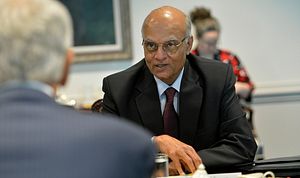An interesting debate is taking place in India on the future of its nuclear doctrine. A number of factors have added a new sense of urgency to this debate – a center-right government in New Delhi that is not shy of dramatically recalibrating Indian foreign and security policy combined with growing concern among Indian strategic thinkers over Pakistan’s reliance on tactical nuclear weapons, as well as Pakistan-China collusion. These factors are rapidly closing India’s room for maneuverability and an ongoing power transition in the Indo-Pacific whereby the Trump Administration is indicating that it may not be averse to new nuclear powers emerging in Asia hasn’t helped.
Though the BJP-led government has so far not proposed any change in the doctrine or the No First Use (NFU) on which India’s declaratory nuclear doctrine is based, it had promised in its 2014 election manifesto to “study in detail India’s nuclear doctrine, and revise and update it, to make it relevant to challenges of current times.” Manohar Parrikar, who was until just three weeks ago India’s defense minister, has questioned India’s NFU policy on nuclear weapons, asking, “Why a lot of people say that India has No First Use policy… I should say I am a responsible nuclear power and I will not use it irresponsibly… And as an individual, I get a feeling sometime why do I say that I am not going to use it first. I am not saying that you have to use it first just because you don’t decide that you don’t use it first. The hoax can be called off.”
But what has really set the cat among the pigeons is a passage in a recent book by India’s former national security advisor, Shiv Shankar Menon, wherein he writes: “There is a potential grey area as to when India would use nuclear weapons first against another NWS (nuclear weapons state). Circumstances are conceivable in which India might find it useful to strike first, for instance, against an NWS that had declared it would certainly use its weapons, and if India were certain that adversary’s launch was imminent.”
This has led some to argue that there is a major doctrinal shift happening in India whereby New Delhi may abandon its NFU nuclear policy and launch a pre-emptive strike against Pakistan if it feared that Islamabad was likely to use the weapons first. This is being viewed by many in the West as a seismic shift in India’s nuclear posture, one which may have significant consequences for South Asian strategic stability.
There are two problems with this deduction. First, random statements from officials do not a policy make. This is especially true of Indian nuclear policy, which has traditionally been the domain of the nation’s prime minister. To date, the government in New Delhi or the Prime Minister’s Office have not indicated that any such shift in Indian nuclear thinking is underway. In fact, it would be highly illogical for New Delhi to go in for such a shift at a time when it is working so hard diplomatically to join the Nuclear Supplier’s Group. Such a move could potentially harm India’s credentials as a responsible nuclear power.
Second, Menon is not a member of the present government. In fact, his book is about his time in office during the previous Congress-led United Progressive Alliance government led by Manmohan Singh. His claims, if accepted, would lead one to conclude that there is nothing recent about this thinking. Indian policymakers cutting across the ideological spectrum have been trying to grapple with Pakistan’s adventurous foreign policy for years now. In fact, Menon’s book talks of Pakistan’s nuclear shield permitting it to undertake terrorist attacks on India without fear of retaliation, a key variable that is resulting in new ways of looking at India’s posture.
Despite this unease about Pakistan and a growing China-Pakistan axis, the debate on Indian nuclear posture has only just begun. It has by no means settled down to a point where we can claim a seismic shift is in the offing. Indian nuclear doctrine was articulated in 1999 and it certainly needs to be reviewed. All doctrines require regular reappraisals and Indian nuclear doctrine will inevitably have to respond to contemporary challenges. Just because a debate has emerged doesn’t imply a policy change one way or another.
And this is where both past and present Indian governments have been at fault. They have allowed multiple voices to drown out official policy. The Modi government needs to articulate the nation’s nuclear doctrine once again, clearly and categorically, both for its friends and adversaries. New Delhi, not Washington or London, should be the birthplace of the nation’s nuclear posture.

































